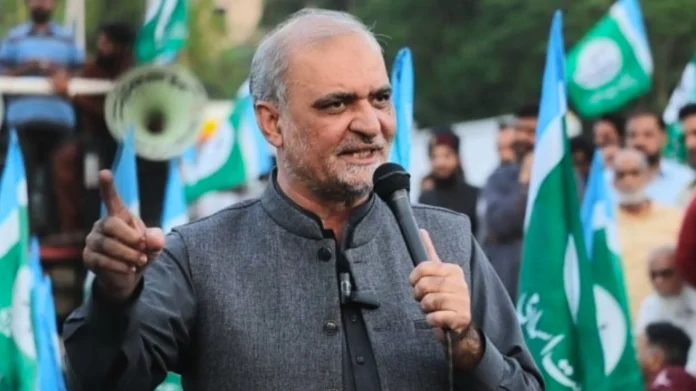Jamaat-e-Islami (JI) Ameer Hafiz Naeem ur Rehman has declared an extension of the party’s ongoing protest, with plans for countrywide protest against rising inflation and the government’s agreements with independent power producers (IPPs), which have led to exorbitant electricity bills.
In his address at the sit-in on Murree Road in Rawalpindi, Hafiz Naeem announced that the first phase of the protest would take place in front of the Governor’s House in Karachi, followed by subsequent demonstrations in Lahore and Multan.
This announcement follows the JI chief’s warning on Saturday to expand the sit-in to other parts of the country if the government failed to meet the party’s demands regarding skyrocketing electricity bills and high taxes.
The party’s sit-in has entered its fifth day, as the government team did not attend the second round of negotiations on Monday.
On Sunday, a three-member delegation comprising Federal Minister for Information and Broadcasting Attaullah Tarar, Amir Muqam, and Tariq Fazal Chaudhry met with the JI negotiation committee, led by Liaquat Baloch, at the Rawalpindi commissioner’s office to discuss a way forward.
The politico-religious party has put forward 10 conditions for ending its protest sit-in against inflation, including a significant hike in electricity tariffs. These conditions include the renegotiation of agreements with IPPs.
Key Demands by Jamaat-e-Islami:
1. Abolition of the Petroleum Development Levy on all petroleum products and reversal of the latest price increases.
2. A 20% reduction in the prices of food commodities, electricity, and gas tariffs.
3. Renegotiation of agreements with independent power producers (IPPs).
4. Elimination of the clause in IPP agreements that mandates payments in US dollars.
5. A 50% discount on electricity bills for consumers using up to 500 units.
6. Reduction of taxes on the agriculture and industrial sectors, decreasing their financial burden by 50%.
7. Provision of incentives to the industrial sector to boost trade and investment, thereby creating employment opportunities for youth.
8. Withdrawal of the recent tax increases on the salaried class and imposition of taxes on the privileged class.
9. A 35% cut in non-development expenses.
10. Removal of all taxes on stationery and other educational materials.
Speaking to party workers in Rawalpindi, Hafiz Naeem criticized the government for the rampant inflation and stated that current policies are leading to the closure of businesses.
He urged the government to reduce electricity prices and conduct an audit of the IPPs, giving a two-day ultimatum for the government to meet their demands, warning that the protests would continue until their conditions were met.
Echoing the party emir’s sentiments, JI Karachi Chief Munem Zafar emphasized the need to end agreements with IPPs and K-Electric, Karachi’s primary electricity provider.
Government Response and Future Prospects
Amidst the ongoing protests, the government has expressed a willingness to find a solution to the IPP issue.
Speaking on Geo News’ “Capital Talk” on Monday, Federal Minister for Petroleum Dr. Musadik Malik indicated that the government is hopeful of reaching an agreement with the Hafiz Naeem-led party regarding the review of IPP agreements.
Addressing the issue of soaring electricity bills, Dr. Malik mentioned that electricity prices are likely to be reduced in the coming days.
He noted that Prime Minister Shehbaz Sharif has formed multiple committees working in various capacities to alleviate the financial burden on the populace.
“The government has decided to bear the additional electricity expenses of 86% of residential houses in the country,” stated Malik, adding that the government has already allocated Rs50 billion for this purpose.
As JI prepares for its nationwide protests, the government’s response and negotiations will be crucial in determining the resolution of this pressing issue affecting millions across the country.




